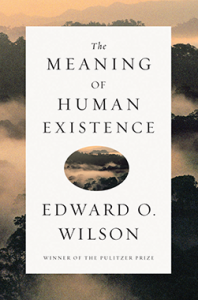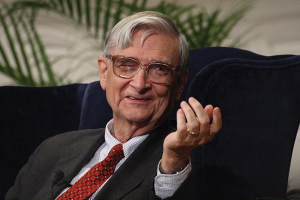The Meaning of Human Existence

There are few scientists alive today who have had as far-reaching an impact as Edward O. Wilson. With a career spanning more than half a century, he is the author of thirty books in which he has guided readers through the world of insect societies and human nature, the world’s biodiversity, and the current Anthropocene. As a scientist who dares to venture into the hallowed halls of the humanities, few subjects have escaped his reach. Now in his mid-80s, it seems natural that Wilson would turn to a topic so vast that it has baffled philosophers for millennia: the meaning of our own existence.
“Does humanity have a special place in the Universe? What is the meaning of our personal lives?” Wilson asks in the opening pages of his latest book, The Meaning of Human Existence. Though such questions may not lend themselves to clear answers, he contends that by now “we’ve learned enough about the Universe and ourselves to ask these [questions]… in an answerable, testable form.” Quick to define what it is he means by “meaning,” Wilson is not concerned with the grand, cosmic purpose for which we exist (there is none) but rather how we came to exist and how our capacity for culture led us from the savannahs to civilization. Calling this “the living world’s greatest epic,” he contends the transformation is the result of biology and culture, and that only by studying it will we know what it means to be human. Any source of meaning will come from ourselves and our history, not from the dictates of a god.
As Wilson takes the reader through our evolutionary history, some biologists may bristle at his lengthy defense of group selection, to which he attributes the source of our social behavior, distinguishing it from other, more established theories (like kin selection). His persistence is understandable, as he happens to be one of the top proponents of this hypothesis, however in truth the jury is still out. This issue aside, Wilson’s science writing is colorful and imaginative, and one finds he is not exaggerating when he calls our ascent an “epic.” To be human, we discover, means having a brain capable of imagined scenarios, complex culture and able to recognize that there are realities out there other than our own. This kind of approach to the human condition must not hide itself within science, Wilson warns, but must be embraced by the humanities.

E.O. Wilson (Photo by by Ragesoss , Licensed under CC BY-SA 3.0 via Wikimedia Commons)
The book’s defense of the humanities and the marriage of C.P. Snow’s “two cultures” form some of its best chapters and explain why Wilson may be one of the most creative scientists of our time. Critical of specialization, he defends the liberal arts, explaining that “[t]he most successful scientist thinks like a poet—wide-ranging, sometimes fantastical—and works like a bookkeeper.” Likewise, for those working in the humanities, any serious engagement with art, culture, or philosophy requires engaging with humankind’s evolutionary origins. It is not enough to study what humans create; we must study as well the very instinct to create. Only then, he suggests, will these disciplines continue to grow.
Where other scientists may be harsh in what they have to say about the humanities, Wilson seems to privilege it; as the discoveries of science converge in all parts of the world, he writes, “What will continue to evolve and diversify almost infinitely are the humanities.” Every culture that ever flourished and faded did so with nuance, and it is possible that if given enough time, each could have discovered gravity or natural selection. But it is only the English who could have produced Shakespeare—in the same way only the Persians could produce Rumi and the Japanese Bashō. Thus the humanities ought to hold a special place in our lives, for they represent, in Wilson’s words, “the natural history of culture, and our most private and precious heritage.”
As hopeful as Wilson is about this joining of domains, he also worries about those “idols of the mind” that threaten both. Turning to religion, he is irritated with those “denominational tribes” that reject evolution and view all criticisms of their sacred creation myths as“religious bigotry.” It may be the case that a religious instinct exists (or rather, the need to belong to a group) but this does not mean we must surrender to it our noblest aspirations. This sort of tribalism is antithetical to the worldview of science and the ethos of the humanities. In fact, Wilson calls it “the true cause of hatred and violence” and “the one thing that makes otherwise good people do bad things.” Contrary to what many may think, “There is no predestination, no unfathomed mystery of life. Demons and gods do not vie for our allegiance. Instead, we are self-made, independent, alone, and fragile, a biological species adapted to live in a biological world.” If the epic of our species is to continue, we have no choice but to free ourselves from these distractions and accept the world—and our place in it—as it is.
Unlike Wilson’s other books, The Meaning of Human Existence reads like a series of short, loosely connected essays instead of a single, coherent work. Some chapters feel disjointed and even tangential to his broader argument (forcing this reader to often retrace his footsteps to figure out how certain sections fit into the whole). Although readers will appreciate his prose, when considered with the oeuvre of his work, this book does not stand alone and should be considered an addendum to On Human Nature (1978) and Consilience: The Unity of Knowledge (1998). That said, anything by Wilson is worth reading, and one ought to expect nothing less than brilliance from him as he continues his long career of engaging with new ideas—or, in this case, reframing old ones like the meaning of human existence.
